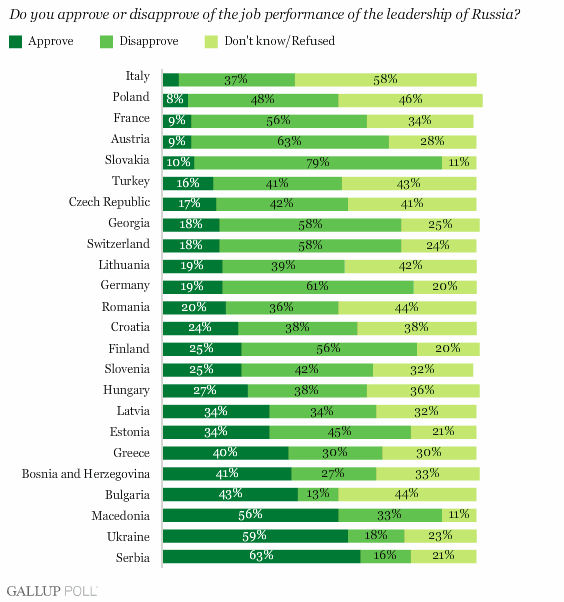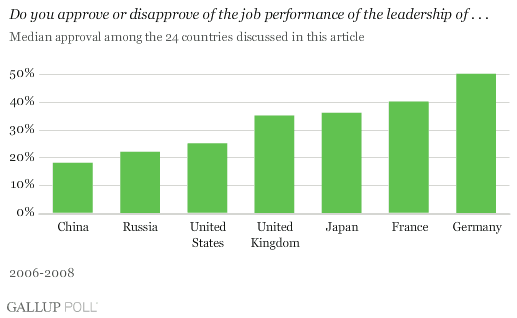WASHINGTON, D.C. -- The ongoing gas dispute between Russia and Ukraine appears to be nearing resolution with Russia close to restoring the flow of gas after a heated disagreement over prices and unpaid bills led Russian energy company Gazprom to stop shipments through Ukraine to Europe on Monday. However, the longer-term effect of the shutoff is yet to be known. Gallup Polls conducted between 2006 and 2008 in 24 European countries affected or potentially affected by the dispute reveal that most of these nations were already more disapproving than approving of Russia's leadership.

Talks that took place Thursday in Brussels yielded a temporary agreement brokered between Russia's Gazprom and Ukraine's Naftogaz to restore gas flow to Europe once independent monitors are in place. The agreement would quell a crisis that has left much of Europe scrambling for alternative energy resources. The disagreement has created a dire situation throughout the Balkan nations as many have been forced to go without heat in the depths of winter.
While Ukraine, along with the United States, is placing the blame for the sudden stoppage on Moscow, Russia's leadership claims Ukraine is at fault for failing to come up with serious proposals to resolve a dispute over gas prices. The European Union has described the supply shortage as "completely unacceptable," and AP quotes EU Commission President Jose Manuel Barroso saying that a continued lack of resolution "will raise very serious doubts about the reliability of Russia as a supplier of gas to Europe and Ukraine as a transit country."
People in several of the countries that have been most approving of Russia -- Serbia, Bulgaria, Bosnia and Herzegovina, and even Ukraine itself -- are also among those most severely affected by the shortage. Other nations whose citizens already give low approval ratings to Russian leadership, including Italy, Austria, and Turkey, are also significantly affected by the crisis and have expressed frustration with Moscow as their gas shipments from Russia have completely ceased.
As a point of comparison, at 22% the median leadership approval of Russia among this group of 24 countries is lower than those approval ratings for several other major nations. Gallup Polls did not ask residents in all 24 nations to rate Ukraine's leadership.

A similar crisis between Russia and Ukraine in 2006 ignited talk in Europe of the need to diversify the region's energy supply. This issue is now resurfacing as European nations again worry that Russia may be an unreliable natural gas supplier. Even if EU, Russian, and Ukrainian officials reach a resolution this week, it is possible that the sudden and damaging effects of Russia's gas power play could linger on the minds of citizens across Europe.
Survey Methods
Results are based on face-to-face interviews conducted from 2006-2008 with 1,000 adults, aged 15 and older, in each country. For results based on the total sample of national adults, one can say with 95% confidence that the maximum margin of sampling error is ±3 percentage points. In addition to sampling error, question wording and practical difficulties in conducting surveys can introduce error or bias into the findings of public opinion polls.
